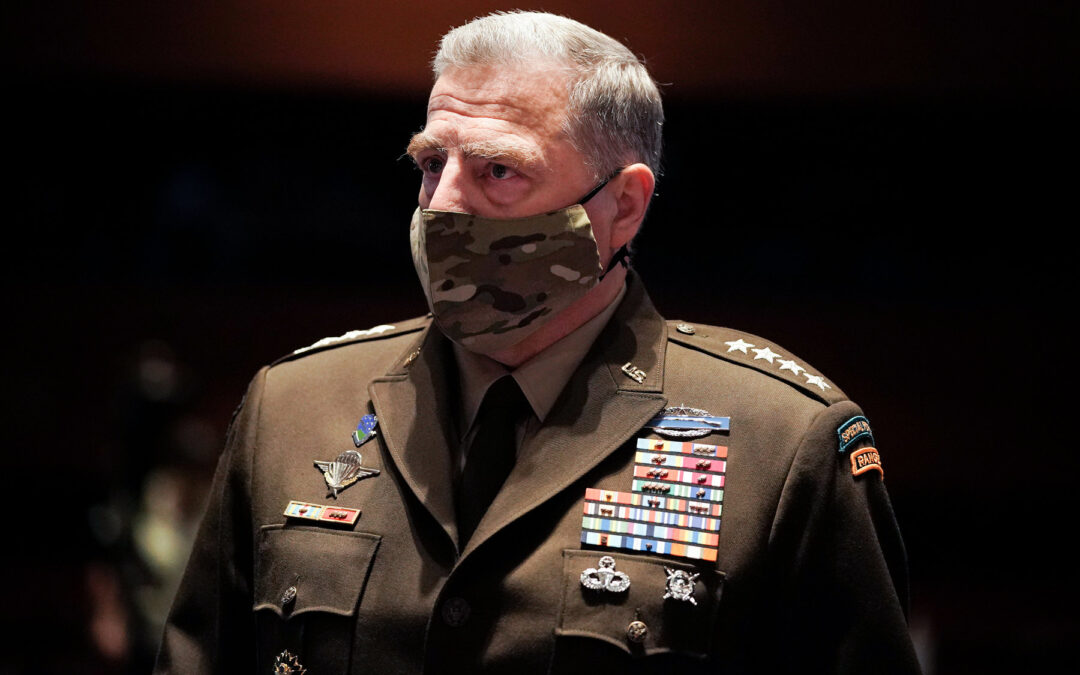Chairman of the Joint Chiefs of Staff Gen. Mark Milley criticized Confederate symbols before the House Armed Services Committee today, and called the Civil War an “act of treason.”
Milley said that minority service members — which he said make up 43% of the U.S. military — may feel uncomfortable that Army bases are named for Confederate generals who “fought for an institution of slavery that may have enslaved one of their ancestors.”
“For those young soldiers that go on to a base of Fort Hood, Fort Bragg, whatever, named after a Confederate general, they can be reminded that that general fought for an institution of slavery,” he said. “I had a staff sergeant when I was a young officer who actually told me that at Fort Bragg. He said he went to work every day on a base that represented a guy who enslaved his grandparents.”
Milley said he has recommended a commission to reconsider the names of military bases named after Confederate generals.
“The Confederacy, the American Civil War, was fought and it was an act of rebellion,” said Milley. “It was an act of treason at the time against the union, against the stars and stripes, against the U.S. Constitution, and those officers turned their back on their oath. I personally think that the original decisions to name those bases after Confederate generals, the 10 bases you’re talking about in the Army, those were political decisions back in the 1910s and 1920s and 1930s and World War I, World War II time frame, 100 years ago. And they’re going to be political decisions today.”
Despite the military and public going the other way on the issue, President Trump continues to back the confederate symbols.
In June, Trump criticized congressional efforts to change the names of the military installations, saying he will “not even consider” renaming bases.
“Our history as the Greatest Nation in the World will not be tampered with. Respect our Military!” Trump said.
The Senate Armed Services Committee yesterday voted to require the Pentagon to rename military bases and other assets named after Confederate generals, a move that puts the Republican-led panel on a collision course with the White House.
The committee adopted an amendment to the annual Pentagon policy bill that gives the Defense Department three years to remove the names of Confederate generals from U.S. military assets, according to a source familiar with the closed-door proceedings.
The language, adopted by voice vote as Trump preemptively threatened to veto any defense bill that did just that, affects massive bases like Fort Bragg in North Carolina and Fort Benning in Georgia.
But it also goes further and includes everything from ships to streets on Defense Department property.
Massachusetts Democratic Sen. Elizabeth Warren offered the provision, which she previewed on Twitter.
“I filed an amendment to the annual defense bill last week to rename all bases named for Confederate generals. It’s long past time to end the tribute to white supremacy on our military installations,” Warren tweeted Tuesday, though it was not clear at the time if the amendment would be offered, or if it had any chance of success.
The Massachusetts senator, a former presidential hopeful, tweeted in response to an opinion piece published by The Atlantic from retired Gen. David Petraeus, calling for renaming military forts.
“As I have watched Confederate monuments being removed by state and local governments, and sometimes by the forceful will of the American people, the fact that 10 U.S. Army installations are named for Confederate officers has weighed on me,” Petraeus wrote.
The amendment would require the Defense Department to set up a commission to develop a plan to implement the renaming, according to the source familiar with the text.
Wednesday’s scheduled White House press briefing was delayed while the administration prepared a statement expressing Trump’s opposition to renaming as many as 10 military bases, citing by name Fort Bragg and Fort Benning, as well as Fort Hood in Texas.
“The president will not be signing legislation that renames America’s forts,” White House Press Secretary Kayleigh McEnany said in response to a question. “Fort Bragg, for example, it’s one of the largest military installations. It’s home to tens of thousands of brave American soldiers, and when you think of Fort Bragg, we think of the brave soldiers that deployed from there.”
The effective veto threat sets up a standoff with Capitol Hill, with House Democrats likely to advance similar provisions in that chamber’s defense authorization, especially after the Senate committee action.
This would be the 60th consecutive year for the defense authorization to become law, if it makes it that far.
Elsewhere in Congress, Speaker Nancy Pelosi of California has formally requested the removal of 11 Confederate statues from the National Statuary Hall Collection.
